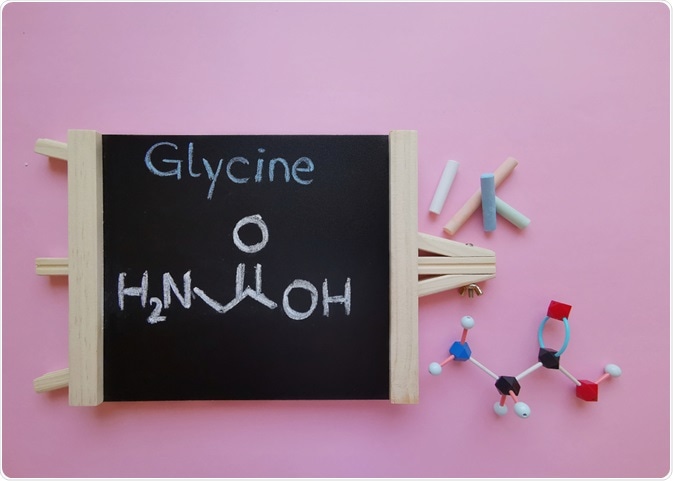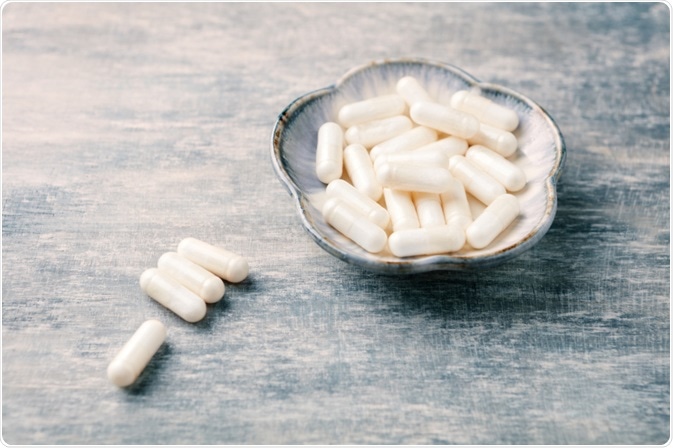Glycine is a non-essential amino acid that is produced naturally by the body. It is one of 20 amino acids in the human body that synthesize proteins, and it plays a key role in the creation of several other important compounds and proteins.

Image Credit: Danijela Maksimovic/Shutterstock.com
It has been shown to be safe as a dietary supplement, although a healthy and varied diet will typically provide the necessary amounts of glycine the body needs.
What is the role of glycine in the body?
The primary function glycine takes on in the body is to synthesize proteins. However, it is also essential for the healthy development of the skeleton, muscles, and tissues.
Glycine benefits for bone health
Although the impact of specific amino acids on bone mineral density and the risk of bone diseases such as osteoporosis has not been identified, glycine has been implicated in promoting bone health.
It is thought that glycine (among other non-essential amino acids) helps bone health through the production of insulin and insulin-like growth factor 1, along with the synthesis of collagen, which is an important protein for bone, tissue, and muscle health throughout the body.
Glycine benefits for muscle health
Glycine can prevent muscles from breaking down by boosting the level of creatine in the body, which is a compound found in muscle cells and made by glycine and two other amino acids.
Boosting creatine in the muscles can help them to perform better in short, intense bursts of activity such as weightlifting or sprinting. Several studies have shown that boosting creatine in the body can lead to increased muscle strength, mass, and power, and it may also help with recovery after exercise and rehabilitation after injury.
One study found that a daily dose of 5 g to 20 g of creatine meant that patients requiring one injured leg to be kept in a cast for 2 weeks experienced less muscle atrophy due to inactivity, and they gained more strength from their rehabilitation exercises than those not taking creatine.
As a result, glycine is a popular supplement for bodybuilders and those wishing to gain muscle mass and strength. However, the body can synthesize creatine itself and can be taken in through the diet, so glycine supplements to boost creatine levels may not always be necessary.

Image Credit: Eugeniusz Dudzinski/Shutterstock.com
Glycine benefits for tissue health
Glycine is found in high amounts in collagen, which is a structural protein that promotes strength and elasticity in the skin. It is the main element that makes up the fascia, cartilage, ligaments, tendons, and bones, and is the most abundant protein in the human body.
Glycine supplements have been shown to reduce the levels of bone loss in osteopenic postmenopausal women, reduce joint deterioration in athletes experiencing joint pain, and increase skin elasticity in older women.
Glycine benefits for sleep
3 g of glycine a day before sleep has been found to improve sleep quality and reduce feelings of fatigue during the day in people with insomnia or those who do not have much time to sleep.
Glycine injections in animal studies have been shown to limit the activity of neurons that are responsible for arousal and energy homeostasis, and glycine injections have also been found to encourage non-REM sleep in mice, although the link between glycine and neuronal activity blocking of this kind is disputed.
Sleep may also be improved with glycine because it decreases the body’s core temperature, and cooler body temperatures are linked with better quality sleep.
It is believed that glycine supplementation activates N-methyl-D-aspartate (NMDA) receptors in the suprachiasmatic nucleus (SCN) and leads to better thermoregulation and circadian rhythm, although the mechanisms through which glycine activates NMDA receptors in the SCN to induce better sleep are not yet understood.

Image Credit: Stock-Asso/Shutterstock.com
Glycine benefits on neurological health
Glycine is also an inhibitory neurotransmitter in the central nervous system and plays a role in the processing of motor and sensory information. It is found in the spinal cord, the brainstem, and the retina, and can both inhibit and promote excitability in various neurotransmitters.
This can be helpful and dangerous depending on the strength of inhibition or excitation and the dose of glycine.
If a dose of glycine is too high, it can cause fatal hyperexcitability in the brain, but highly inhibited glycine can cause muscular convulsions and asphyxia, causing death. This is because glycine receptors can be blocked by strychnine, which in high amounts causes these fatal complications.
However, the inhibitory functions of glycine help manage psychological conditions such as schizophrenia, and glycine has become a potential therapeutic route for the management of schizophrenia symptoms.
Glycine can increase the neurotransmission of NMDA, and low levels of NMDA receptors have been reported as a possible contributing factor to the development of schizophrenia. Glycine is safe for short- and long-term use, and as such it is a possible effective treatment for the symptoms of schizophrenia.
Literature reviews have found that creatine supplements may improve short-term memory function and the reasoning capabilities in healthy people, although its benefits on those living with dementia or other degenerative cognitive diseases have not been fully ascertained.
Related to glycine’s role in the creation of creatine, it has been widely documented that creatine has neuroprotective properties. Animal studies investigating the benefits of creatine supplementation on traumatic brain injuries (TBI), cerebral ischemia, and spinal cord injuries (SCI) have found that creatine can improve the level of damage to the cortical region from 36 to 50 percent, and in rats with spinal cord injuries, creatine supplementation improved locomotor function.
As it has been proven safe to consume as a supplement, creatine supplementation could, therefore, have potential as a therapeutic agent in humans to treat TBI and SCI.
What other sources of glycine are there?
Although glycine is made naturally by the body, it can also be found in a range of common foods, including meat, fish, dairy products, and legumes. These protein-rich foods should provide the body with enough glycine to function healthily without the need for glycine supplementation.
Glycine supplements are made in powders or capsules, and powders are often added to food and drinks because of their naturally sweet taste.
Summary
Although glycine is the simplest amino acid, it has a complex array of functions and effects on the body. While it can inhibit certain neurotransmitters that can improve certain psychological conditions, it can also excite neurotransmitters that cause muscular convulsions and potentially fatal brain hyperexcitability.
It is safe to consume as a dietary supplement in appropriate doses, both for short- and long-term use, however, the body will usually receive the right amount of glycine from a varied, healthy diet. It has a range of benefits that include the bones, tissues, muscles, and central nervous system, and as such is one of the most important non-essential amino acids in the body.
References
- ACNP. (2000). https://www.acnp.org/g4/GN401000008/Default.htm
- Albert, A., et al. 24-week study on the use of collagen hydrolysate as a dietary supplement in athletes with activity-related joint pain. Current Medical Research and Opinion. https://pubmed.ncbi.nlm.nih.gov/18416885/
- Almada, A. L., et al. International society of sports nutrition position stand: safety and efficacy of creatine supplementation in exercise, sport, and medicine. Journal of the International Society of Sports Nutrition. https://jissn.biomedcentral.com/articles/10.1186/s12970-017-0173-z
- Amino Acids Guide. (2018). https://aminoacidsguide.com/Gly.html
- Arjmandi, B. H., et al. A calcium-collagen chelate dietary supplement attenuates bone loss in postmenopausal women with osteopenia: a randomized controlled trial. Journal of Medicinal Food. https://pubmed.ncbi.nlm.nih.gov/25314004/
- Avgerinos, K. I., et al. Effects of creatine supplementation of cognitive function of healthy individuals: a systematic review of randomized controlled trials. Experimental Gerontology. https://pubmed.ncbi.nlm.nih.gov/29704637/
- Bannai, M., et al. The sleep-promoting and hypothermic effects of glycine are mediated by NMDA receptors in the suprachiasmatic nucleus. Neuropsychopharmacology. https://www.ncbi.nlm.nih.gov/pmc/articles/PMC4397399/
- Cassidy, A., et al. Amino acid intakes are associated with bone mineral density and prevalence of low bone mass in women: evidence from discordant monozygotic twins. Journal of Bone and Mineral Research. https://pubmed.ncbi.nlm.nih.gov/26334651/
- Degwert, J. et al. Oral supplementation of specific collagen peptides has beneficial effects on human skin physiology: a double-blind, placebo-controlled study. Skin Pharmacology and Physiology. https://pubmed.ncbi.nlm.nih.gov/23949208/
- Ermilov, M., et al. Efficacy of high-dose glycine in the treatment of enduring negative symptoms of schizophrenia. Arch Gen Psychiatry. https://jamanetwork.com/journals/jamapsychiatry/fullarticle/204616#:~:text=The%20ability%20of%20glycine%20to,resistant%20negative%20symptoms%20in%20schizophrenia.
- Hausmann, O. N., et al. Protective effects of oral creatine supplementation on spinal cord injury in rats. Spinal Cord. https://www.nature.com/articles/3101330
Last Updated: Mar 4, 2021